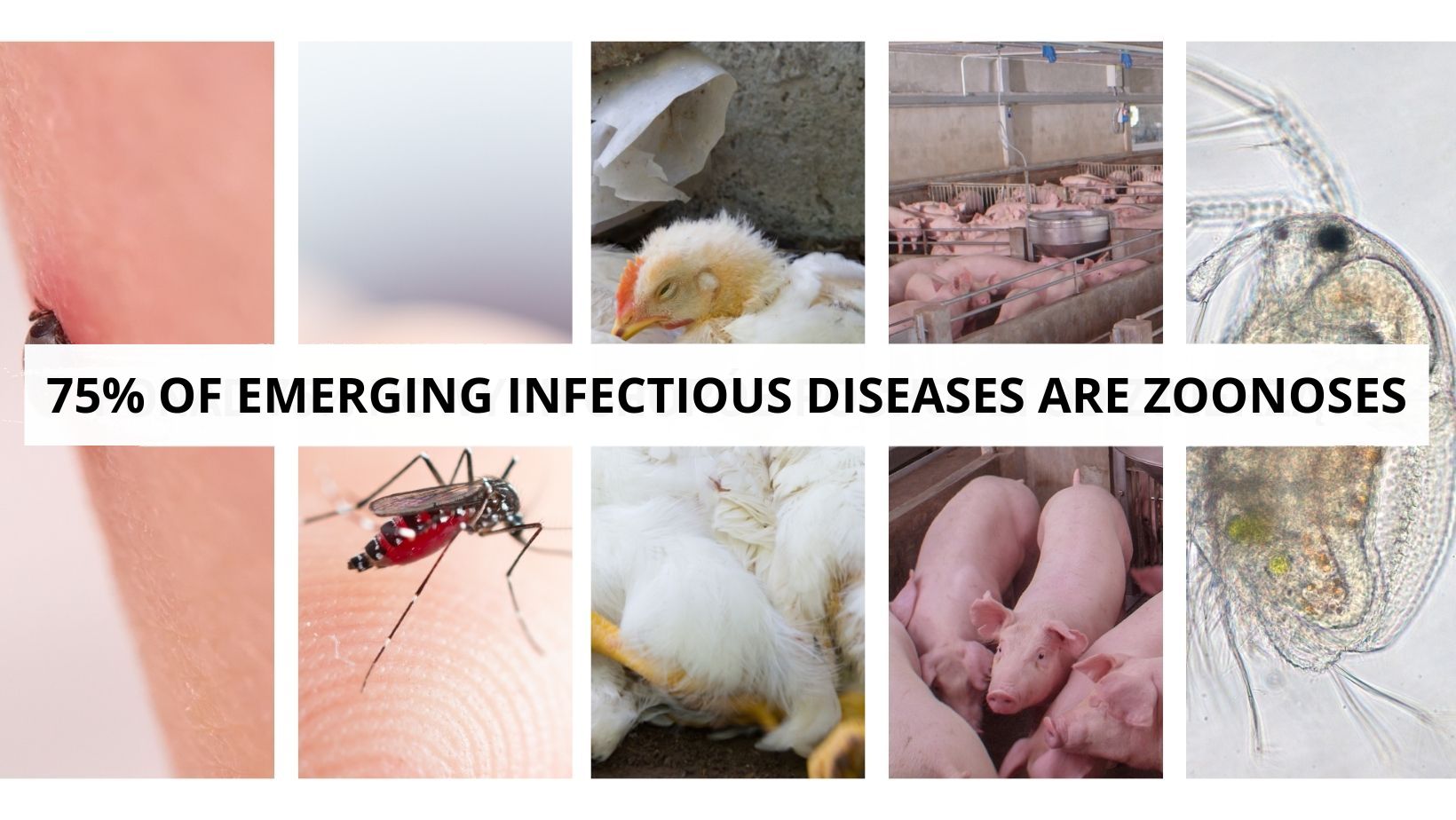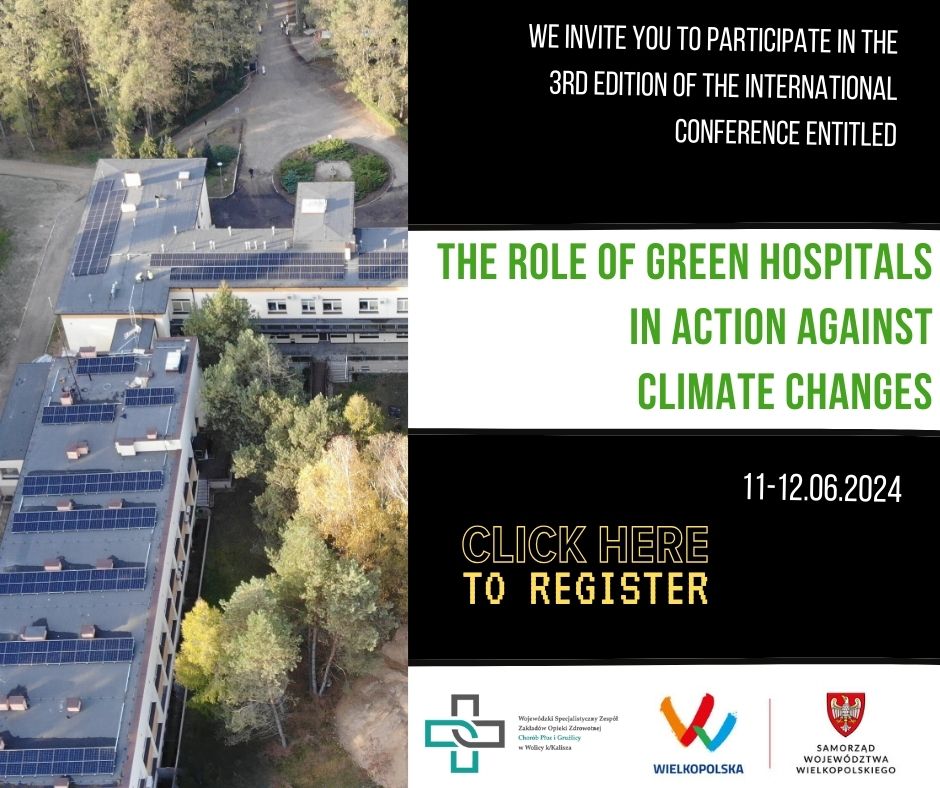International Conference “The Role of Green Hospitals in Combating Climate Change” in 2024

3rd International Conference on “The Role of Green Hospitals in Counteracting Climate Change”
Kalisz 11-12 June 2024r.
“For too long, we have been waging a senseless and suicidal war on nature. The result is three interlinked environmental crises: climate disruption, biodiversity loss and pollution that threaten our viability as a species. They are caused by unsustainable production and consumption. Human well-being lies in protecting the health of the planet. It’s time to re-evaluate and reset our relationship with nature.”
António Guterres, the Secretary-General of the United Nations
A new era of climate change medicine is upon us. New diseases are being identified and existing diseases are being exacerbated. Climate, which has always been associated with health, is now one of the main forces disrupting healthcare provision. Scientists agree on one thing: an expected temperature rise of 1.5°C above the pre-industrial average will cause catastrophic damage to health.
The year 2023 has gone down in history as the warmest since measurements have been taken. The average temperature across the planet was as much as 1.46 degrees Celsius higher than the average before the industrial era. Once incidental, extreme weather events, i.e. heat waves, fires, hurricanes, torrential rainfall, floods, earthquakes with a magnitude exceeding 7 on the Richter scale, are now becoming more frequent.
The climate crisis greatly determines the occurrence of infectious diseases transmitted by animal vectors. Climate warming induces changes in parasite populations and their hosts, which further increases the possibility of pathogen transmission by wild migratory species to livestock, including those for human consumption. Higher temperatures allow vector species to colonise new areas previously inaccessible due to excessively low temperatures and for pathogens to survive in more favourable climatic conditions.
COVID-19 has killed more people than the three global plagues combined. Zika, Ebola, Dengue, Swine flu, Mad cow disease, SARS, MERS, Lyme disease, Haemorrhagic fever, Tick-borne encephalitis, Leishmaniasis, Malaria, Plague, Toxoplasmosis …

The next pandemic could be much, much more dangerous. And it could happen sooner than we think. If we go back to what we had before the pandemic and don’t learn the right lessons, we will fail future generations [Tedros Adhanom Ghebreyesus Director-General of WHO].
Polluted air can cause many health and environmental problems. Smog and other forms of pollution cause respiratory diseases, heart attacks, allergies, headaches or even cancers, particularly of the lungs, larynx and throat. Climate change affects everyone’s health, but pulmonary patients are undoubtedly among those most susceptible. The adverse effects of global warming will be felt most by those suffering from diseases such as asthma and chronic obstructive pulmonary disease. The WHO leaves no illusions here – exposure to polluted air is responsible for the premature deaths of 7 million people every year! Only 0.001% of the world’s population is not exposed to PM2.5 pollution above levels that the World Health Organisation (WHO) considers safe for health. According to data from the European Environment Agency, around 45 000 people die prematurely in Poland every year due to air pollution. Poor air quality also negatively affects mental health, in particular depression and anxiety. Between 20-50% of survivors of unpredictable and extreme weather events can experience an immediate increase in anxiety, depression, post-traumatic stress disorder (PTSD), sleep disorders and suicidal thoughts. Europe is facing a major public health crisis, with almost everyone across the continent living in areas with dangerous levels of air pollution” [The Guardian]. The situation is worst in central and eastern Europe, including Poland.
It used to be that evolution was associated only with Charles Darwin and homo sapiens. Today, as a result of climate change, we have the evolution of many diseases. And this is no longer just a theory. It is a fact. Warmer summers and milder temperatures have allowed pathogens to gain footholds in regions where populations have low immunity and warning systems are poorly developed. Rising sea temperatures are causing algae or cyanobacteria to proliferate in lakes, rivers, oceans and bays. This in turn exposes marine life, wildlife and people to potent neurotoxins. Air pollution affects crops, trees and other plants, and can make lakes and rivers unsuitable for fish and other animals, resulting in disruptions to the food supply chain.
Paradoxically, the health care system is on the one hand dealing with the health effects of climate change, while at the same time we ourselves are influencing global warming. Indeed, health care is responsible for 4.4% of carbon dioxide emissions into the world’s atmosphere. 10% of all smog-related illnesses and 9% of all particle-related respiratory illnesses can be attributed to the healthcare industry’s carbon emissions. If healthcare were a country, it would be the world’s 5th largest source of greenhouse gas emissions (HCWH). At the same time, healthcare is one of the few industries that has the scientific basis, community involvement and, perhaps most importantly, the motivation to ‘first do no harm’ and evolve rapidly. The healthcare system can integrate community information into clinical and public health practice. Our voice is important and vitally needed to lead in these polarised times. We cannot pretend that the problem does not exist.
If we do not intervene, the climate crisis will wipe out much of the progress made in health and global poverty reduction. Through our actions and advocacy for Green Hospitals, we want to encourage those responsible for maintaining health care facilities to implement sustainable strategies. We argue that environmental education is also about health prevention. Indeed, environmental protection has become an important element of public health protection and requires the creation of tools to integrate health into various types of decisions, plans, policies and investments. Globally, health systems have set specific targets for sustainability and carbon neutrality. Abroad, these actions are progressing at a faster pace. In Poland, it looks a little different. Hospitals face other problems on a daily basis – often financial. We are no exception. However, this does not absolve us from the obligation to work on ourselves to improve the climate neutrality of the facility and to make efforts to mitigate the effects of climate change, and to prepare the hospital so that it is ready for the consequences of this war. Yes war – because climate change is nothing less than public enemy number 1, and Humanity has to fight the most important battle of all today – the battle for Earth.
The CEO and the team of Wolica Hospital
zadawane pytania Dla wygody użytkownikó przygotowaliśmy spis ABC pacjenta.
Nie udało Ci się znaleźć pomocy?
Jeżeli nie udało Ci się znaleźć interesującego tematu,
a potrzebujesz pomocy, skontaktuj się z Nami

